The Great People of Itsekiri
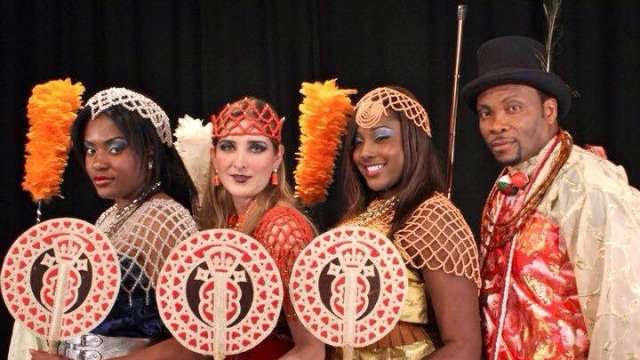
Itsekiri people are more dignified in behaviour and traditional conduct.
The uniqueness,class and peculiarity is a
special characteristic of this great people.
**History of Itsekiri people** According to history during the 15th century, there lived a fiery and self-willed young man known as Prince Iginuwa (Ginuwa).
Prince Iginuwa who was the eldest son of the then Oba Olua- the fourteenth Oba of the great Bini (Benin) kingdom. The chiefs of the then kingdom did dislike him but his father the king did love him, he was hated because he was impatient of the taboos and traditional conventions of the times. And not willing to be patient for his time as an Oba to come before doing away with that which he considered as wrong, he started parading gangs of hot headed fellows and began a frequent terrorization on the chiefs and their supporters.
As a result of this, the provoked chiefs who already harboured a dislike for him conive secretly and the meeting was presided by the chief minister (Iyase).
A decision was reached: The young Prince Iginuwa and his associates are to be eliminated by what so ever means or method.
Traditionally, it is the custom of the Bini kingdom for the son who was chosen Edaiken (crowned prince) to live outside the capital among the hereditary chiefs to whose ranks he belonged.
This was the reason that made it possible for the young Prince to carry out his crusade without the curtailment of his father- Oba Olua. And likewise, the decision of the chiefs.
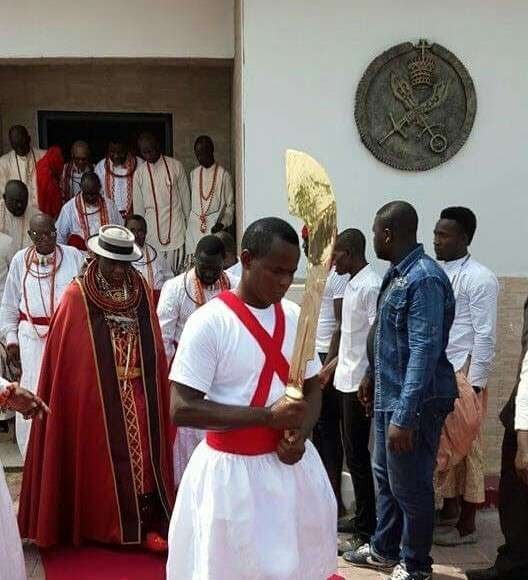
However, upon hearing the secret conclusion of what was likely to happen to his son, Oba Olua consulted his chief priest ( Ogiefa ) as to what must be done to save the life of his young prince.
"An idea of smuggling the prince out of the kingdom as soon as possible," was the only counsel the priest gave the king after consulting the oracle as at then.
Without further hesitation and lingering around, Oba Olua ordered an "ark of iroko wood" to be hastily constructed: An ark big enough to safely convey not only the prince but also the eldest sons of the seventy chiefs of Bini.
With this intention in the mind of the king, a meeting of the central council was summoned when the ark was completed. Oba Olua informed the chiefs that he was sending his son Prince Iginuwa to perform desirable rites to the river goddess- Olokun; and to accompany him, he demanded from them their first sons.
The king has spoken, and from the council, no objection was made.
So, it happened that when the appointed day did come, the entourage of the Prince and I Ginuwa and their sons entourage that they were embarking on a voyage without return was known to only the Oba, the chief priest, and the palace attendant who birthed the escape plan, every other person including the chiefs didn't know.
In their ignorance, they concurred with the Oba in wishing the prince safety and good luck on his journey in Edo language by saying "OKHIENWERE O..."
Thereupon, the ark was carried by slaves through the dense forest which spans across the present route of Sapele for days...
Upon arrival at the banks of river Ethiope, the iroko ark was lowered and prince Iginuwa came out, adorned himself with the regalia of kingship, and assumed the role of one.
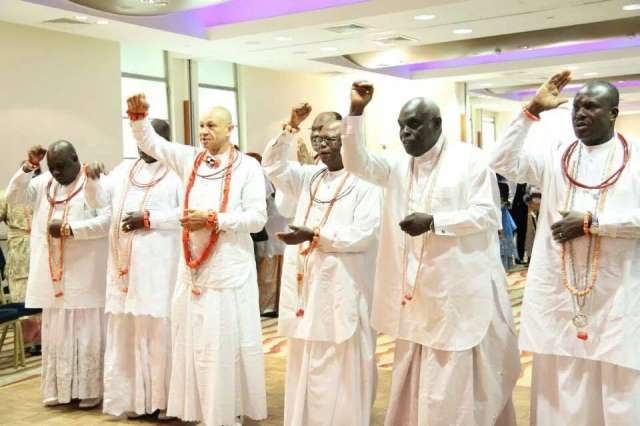
The rugged Prince made himself a king without a kingdom.
However, after a long wait, the Bini chiefs got to realize that they've been tricked by their king and their next line of action was to dispatch soldiers to bring Prince Iginuwa and their sons back to the Kingdom.
Eventually the information did reach the prince that an bounty for him was on. Upon hearing this he ordered a quick evacuation as he instructed them to board the ark.
And from Ugharegin where it is believed the Prince and his retinue had first settled, they sailed to Efurokpe, but not being satisfied with the safety of the new place of settlement, the prince king launched another voyage.
But this time the voyage would be long; tedious, and difficult.
Historians refused telling us, precisely, how long it took the prince and his royal entourage to sail through the high waves of the Forcados River.
Llllllll Nonetheless, it came to be that their sail led them to the small settlement called Amatu, where they did live for a while.
Amatu then was a place of beauty and wonder according to history. Its glittering white sand was bed to alligators and crocodiles. The sun beam was soothing to the skin and the air a pleasure to exhale a place any one would love to be.
The fact still rains that these men where southerners and not tourist: Food to them was far more important than the splendor of Nature itself.
"Amatu with all its wonders was unproductive."
There were, however, more fertile headlands inhabited by the Ijohs (Ijaws). Oruselemo was one of them.
A cordial relationship with the royal entourage was birthed as a result of the accommodating spirit of the Ijaws. Thus Oruselemo did not only become their home, Prince Iginuwa also married an Ijoh woman named Derumo as a sign of coming in peace and not war.
Layer on, after so many years of peace at Oruselemo, a small dispute arose between the migrants and the Ijaws of Gulani (Ogulagha) on the account of the woman Derumo.
Reason was because: The hot-tempered prince had killed her.
And the cordiality that existed between the royal entourage and the Ijaws was replaced with coldness and hatred.
It is as a result of this that the prince king in his wisdom thought it more reasonable to move again.
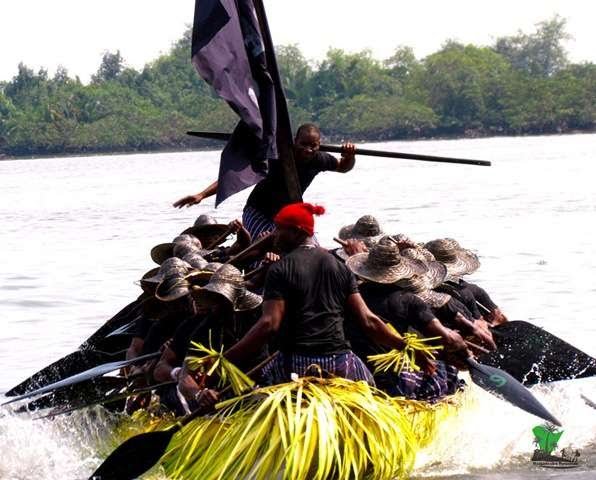
The ark was launched... and another voyage was embarked.
They sailed passed the present site of Forcados and Burutu as the Ark steered north into the Warri River. It is said that the days of this particular quest were not only filled with strain and misery, depression and gloominess also thought it fit to take comfort in their souls.
After days of hardship, Prince Iginuwa and his entourage finally landed at a virgin land that would be later known as Ijala. And as at now he had become the father of two fine boys: Prince Ijijen (Ijiyem) and Prince Irame.
They would raise a mini town and settle there.
But not long after they found comfort, news of their whereabouts reached Bini and as expected, an Army was sent to bring back the running prince.
It should be emphasized here that this was the era when men were more spiritually inclined; and owing to this, messages will always find ways to deliver themselves.
The information had come to them at Ijala and without hesitation the mobile kingdom started making preparations for another evacuation.
But exertion and stress has made weary the soul of their commander. King Iginuwa would not make it out of Ijala. He joined his ancestors amidst the preparations.
And there, he was buried.
It is for this reason that Ijala had become the only burial place of Olus (Itsekiri kings) since 1500 AD till date.
Certainly, there was no time for exaggerated mourning... danger was fast approaching.
Primogeniture would help pave the way for Prince Ijijen to take up the royal command. And without objection the honour of a king was duly accorded him.
Thus, the planned movement from Ijala was, therefore, executed by Prince Ijijen with the aid of an Idibie (medicine man or a diviner) who threw a magical spear (Egan or Etsoro) that was believed to have landed at a location called Okotomu, now Ode-itsekiri (Big Warri).
The tracing of that spear by Prince Ijijen and his people, with the help of the Idibie, finally brought them to the spear's location.
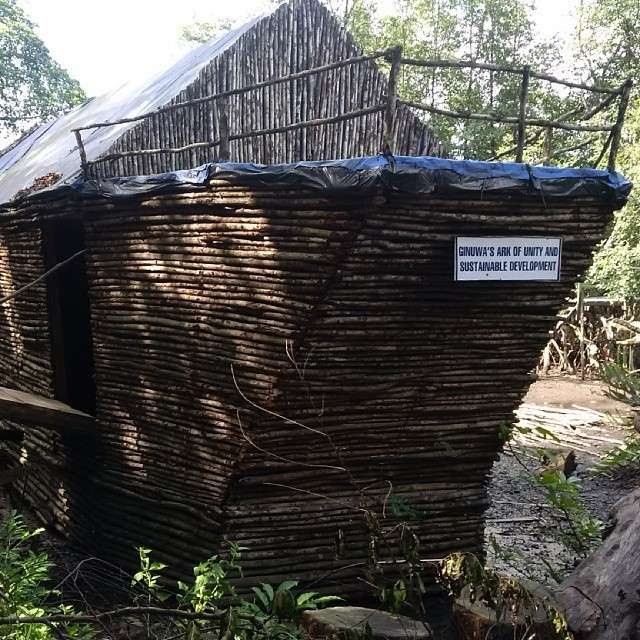
Hi! I am a robot. I just upvoted you! I found similar content that readers might be interested in:
http://www.pulse.ng/lifestyle/food-travel-arts-culture/itsekiri-people-history-culture-and-the-iwere-kingdom-id6571004.html